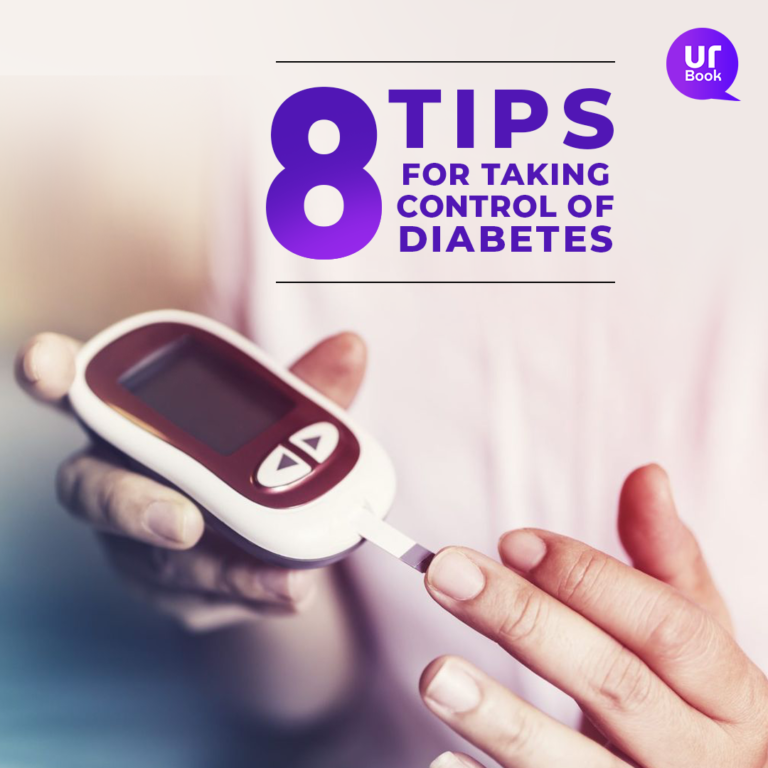
There are 8760 hours in a year. If you live with diabetes, you spend about 3 of those with your doctor. For the rest of 8,757 hours, you are responsible for controlling diabetes to live well and avoid complications like heart attack or stroke, eye problems, teeth, and gum issues damage to hands, feet, or kidneys.
So take the condition seriously. Don’t blithely ignore it with an “Oh, it’s just a little high sugar” attitude. We know it can be overwhelming, but you can learn to manage it with ease.
Controlling diabetes every day with wise choices and smart tools
Diabetes management can cause stress, anxiety, and even worry about navigating day-to-day life, which is why knowledge is the best way to take control of diabetes.
Tip 1: Learn about diabetes
Make the effort to understand the type of diabetes you have because it informs your care plan. There are two broad categories, and this article explains the difference between the two brilliantly, but here’s a gist:
- Type 1 diabetes is when the body attacks the cells in your pancreas, which means it cannot make any insulin. Since it’s genetic, children and young adults get this type of diabetes most often, and they live with it for life.
- Type 2 diabetes occurs when the body is unable to make or use insulin well. It’s the most prevalent kind and occurs in middle-aged and older adults.
Knowing The symptoms is another way of learning about the disease that will help. Keep a check on symptoms like-
Most Common Symptoms
- Increased Thirst
- Increased Hunger
- Increased Urination
- Unexplained weight loss
Few uncommon symptoms
- Frequent Urinary tract infections
- Vision related issues like blurred vision or patchy vision
- Numbness & tingling in hands and feet
- Skin related issues- Dry skin, itching etc.
Tip 2: Eat well
What you eat goes a long way toward controlling diabetes, especially type 2 because it’s a lifestyle disease. For example, avoid carb loading in one meal, so your glucose levels don’t spike unnecessarily. This post explains eating healthily in detail (click that link and read it). In addition:
- Learn to read labels when grocery shopping
- Understand how different foods impact your blood sugar
- Get in touch with a nutritionist and ask for a healthy diet plan.
Tip 3: Be active
The starting point for controlling diabetes is lifestyle modification. The first is eating the right food. The second is physical activity. Being active and shedding weight (if you are overweight) can help your body use insulin more effectively, reducing your dependence on the medicine. We spell out how to start working out to lose weight point by point in this article. Don’t skip it.
Tip 4: Take medication and monitor
Know your pills and insulin. This includes knowing the right dose and taking it at the right time. If you notice side effects from diabetes medicine, consult your doctor right away.
Keep track of your glucose levels. Regular testing and recording it makes you better friends with diabetes. And that, in turn, helps you make a more informed decision on a suitable diet, the correct medicine, etc. If you’re new to diabetes, ask your doctor how and when to test your blood sugar.
Tip 5: Reduce risks
Quit smoking and cut back on alcohol. Measure your blood pressure and record it too. Carry a juice box, glucose tablet, or equivalent with you at all times so you have an emergency fix for low sugar.
Every night, run an eye on your feet, especially if you’re an older adult. Call your doctor if you notice red spots, cuts, sores, blisters, or even swelling.
- Visit your doctor twice annually (or more if so advised) and go over the diabetes care plan, including your blood pressure and sugar records.
- Get your A1C tested two times a year.
- Once a year also opt for cholesterol and blood tests (the latter to assess kidney health).
- Get your feet, teeth, and eyes examined by a professional yearly.
Tip 6: Set reminders
A very basic step to controlling diabetes is setting reminders for meals, snacks, and medication. An alarm is a small thing, but it does a big job of alerting you and ensuring that you don’t miss a meal or medicine simply because you were distracted elsewhere.
Tip 7: Control diabetes with support
There are good days and bad days when you live with diabetes. A support system can help you cope better, so build a strong one. With family and friends surrounding you, you’re more likely to stick to your diabetes care plan.
Moreover, they can help reduce stress – a known factor in raising blood sugar. A handful of other ways to cope well are:
- Deep breathing, meditation, listening to music, or gardening can lower stress.
- Voice your concerns to a mental health practitioner. It pays dividends by making you feel better.
Tip 8: Lean on technology
Not everyone has carers to ensure blood sugar levels are monitored and medications are taken on time. And even with carers around, managing diabetes is tricky and dangerous work. This is where technology comes in very handy.
There are mobile apps that help you beat diabetes into submission. From reminders on medication to logging blood sugar directly from your meter, from doctor calls to spotting patterns, they automate everything so managing the condition becomes effortless.
Controlling diabetes: take the reins with QurBook
Taking charge of your diabetes is empowering. When your glucose levels are as close to normal as possible, you feel good, have more energy, are less tired, and have fewer complications.
That is why we, at QurHealth, designed a diabetes management plan just for you. It includes every step needed to take control of your condition, from glucometers to dietitian consultations.
Find a plan that fits you and take the reins in your hand!
